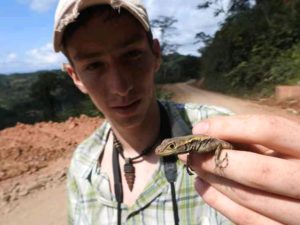What is your background? Where are you from? what do you study? What are you most interested in, scientifically?
I am an undergraduate student in biology at the Universidad Mayor de San Andres, in La Paz Bolivia, where I was born. Currently, I am working in my thesis that should be finished in around July. The aim of this research is to evaluate the variation of the chemical composition (biflavonoids) and foliar functional traits in Podocarpus ingensis across an elevation gradient. This is a not-well-known gymnosperm species with a huge pharmacological and medical potential, but doesn’t have almost any ecological or chemical studie to support its value. I am mostly interested in plant functional ecology with greater emphasis on the physiological and chemical aspect, especially in plants with ethnobotanical or medical value. Obviously, I still have a lot to learn on these topics. I also participated in several projects studying the relationship between the diversity of arthropods and mycorrhizae with the diversity of tree species in the Amazonian tropical rainforests.
What are your goals for the upcoming course in Peru? How will you know if you’ve met these goals?
My goal is to learn as much as possible about the different methods and scientific background necessary to study functional traits in order to use this knowledge for future ecological studies, focusing on elevation gradients in montane forests, which hold a great ecological importance, but remain poorly studied and threatened by anthropogenic loss of territory. I will know if I have met these goals at the moment of applying this knowledge in my research and when raising new studies.
What are you most excited about, with respect to the upcoming course and trip?
I am really excited about the whole experience, including the research to be carried out, exchanging experiences and knowledge with people from all around the world who have great experience on scientific research, and of course, the beautiful place where we are going to be working.
What do you anticipate people will think about climate change in Peru? Do you think most people will accept that that the planet is warming, and that this is largely being caused by human activities? Or will this topic be controversial?
Based on my past experiences, I believe that most people will be aware of climate change, specially the younger generations, but most people won’t relate humans as the main cause of this global phenomenon, since it is not too intuitive to visualize this relationship in such a great scale. So, I consider it will be a controversial topic.
What do our know about public perceptions of climate change in your home country? What, if anything, have you experienced related to public perceptions of climate change?
Usually people are very skeptical about accepting the main anthropogenic cause of climate change, even if they are aware that each year is warmer than the last one.
For example, in the Andean side of my country, there is a very common tradition for producing dehydrated potatoes, called “chuño”, in order to store them for long periods. For that, it is necessary to leave the potatoes several nights in the highest parts of the mountains, where freezing temperatures are reached. But now, many people that still participate in this ancestral tradition told me that it is no longer possible to do that in any mountain. Each year, people have to go to higher mountains, near the glaciers, to achieve their goal.
